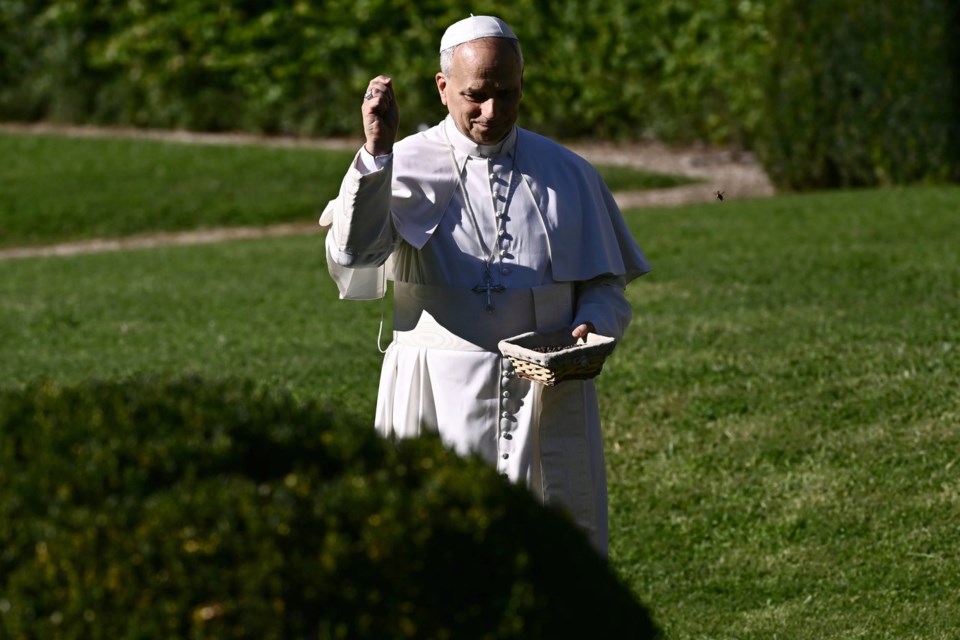ROME (AP) — Pope Leo XIV fed fish in the fishpond, pet horses and visited organic vineyards Friday as he inaugurated the Vatican’s ambitious project to turn Pope Francis’ preaching about caring for the environment into practice.
Leo formally opened Borgo Laudato Si, a 55-acre utopian experiment in sustainable farming, vocational training and environmental education located on the grounds of the papal summer retreat in Castel Gandolfo. The Vatican hopes the center, open to student groups, CEOs and others, will be a model of ecological stewardship, education and spirituality for the Catholic Church and beyond.
Leo travelled by helicopter to Castel Gandolfo and then zoomed around the estate’s cypress-lined gardens in an electric golf cart to reach the center, which is named for Francis’ landmark 2015 encyclical “Laudato Si,” or Praised Be. The document, which inspired an entire church movement, cast care for the planet as an urgent and existential moral concern that was inherently tied to questions of human dignity and justice, especially for the poor.
Leo has strongly reaffirmed Francis’ focus on the need to care for God’s creation, and celebrated the first “green” Mass in the estate’s gardens earlier this summer, using a new set of prayers inspired by the encyclical that specifically invoke prayers for creation. On Friday, some 10 years after Laudato Si was published, Leo presided over a liturgy to bless the new center after touring its gardens, farm and classrooms.
Leo recalled that according to the Bible, human beings have a special place in the act of creation, created in the “image and likeness of God.”
“But this privilege comes with a great responsibility: that of caring for all other creatures, in accordance with the creator’s plan,” he said. “Care for creation, therefore, represents a true vocation for every human being, a commitment to be carried out within creation itself, without ever forgetting that we are creatures among creatures, and not creators.”
A greenhouse inspired by St. Peter's Square
Leo spoke from the heart of the project: a huge greenhouse in the same curved, embracing shape as the colonnade of St. Peter’s Square that faces a 10-room educational facility and dining hall. Once it’s up and running, visiting groups can come for an afternoon school trip to learn about organic farming, or a weekslong course on regenerative agriculture.
The center aims to accomplish many of the goals of the environmental cause. Solar panels provide all the power the facility needs, plastics are banned and recycling and composting systems used to reach zero-waste. Officials say water will be conserved and maximized via “smart irrigation” systems that use artificial intelligence to determine plants' needs, along with rainwater harvesting and the installation of wastewater treatment and reuse systems.
There is a social component as well. The Vatican’s first-ever vocational school on the grounds will aim to provide on-site training in sustainable gardening, organic winemaking and olive harvesting to offer new job opportunities for particularly vulnerable groups: victims of domestic violence, refugees, recovering addicts and rehabilitated prisoners.
The products made will be sold on-site, with profits re-invested in the educational center: Laudato Si wine, organic olive oil, herbal teas from the farm’s aromatic garden and cheese made from its 60 dairy cows, continuing a tradition of agricultural production that for centuries have subsidized monasteries and convents.
While school groups are a core target audience, organizers also want to invite CEOs and professionals for executive education seminars, to sensitize the world of business to the need for sustainable economic growth.
Officials declined to discuss the financing of the project, other than to say an undisclosed number of partners had invested in it and that confidential business plans precluded the Vatican from releasing further information.
___
Associated Press religion coverage receives support through the AP’s collaboration with The Conversation US, with funding from Lilly Endowment Inc. The AP is solely responsible for this content.
Nicole Winfield, The Associated Press


